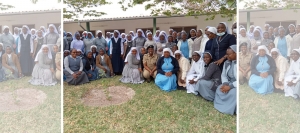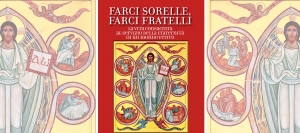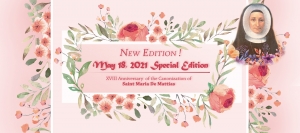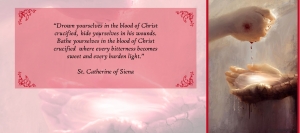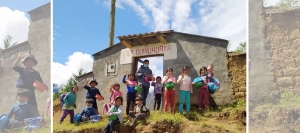Redazione
Seminar on Human Trafficking : Miyuji – Dodoma, August 17-19, 2021
The main purpose of the seminar was to deal with this problem and find ways to bring about an end to this trade. The problem exists and is spread throughout the world. Its impact upon the victims, business and the perpetrators were talked about. The suffering and the disadvantages the victims face are staggering: separation from family, psychological problems, stress, bad environments, infectious diseases and death.
The advantages for those involved in this business are easy wealth and a comfortable and luxurious life. Some of these victims are taken by mutual agreement with family or among village leaders on false promises that are only discovered to be untrue after the victims have left. Suffering, sexual abuse, hard labor, removal of body organs (kidneys, heart, intestines, etc.) girls used as stress entertainment for men, beaten while others are killled and never found again. Most of the time it is poverty, unemployment, lack of education, desire for a better life, false beliefs and corruption that lead to it. The human being is treated like a commodity.
The presentation of these atrocities committed against the human person created in the image and likeness of God (Gen. 1:26-28) shook us deeply and called us to the responsibility each of us has to raise our voices in defense of God’s creation. (Is. 1:17)
Given the gravity and dimensions of the problem, as religious women we cannot deal with this work alone, because these organizations have used broad networks. Therefore, there is a great need to talk with the people in authority to learn the strategies they have adopted to deal with the problem.
During the seminar, we had the opportunity to visit with the offices of the Minister of the Interior, to meet Minister Simbachawene and to hear from him about the program of the Tanzanian government regarding human trafficking. After the presentation, they were happy to see the significant contribution of the Church in the fight against human trafficking.

All the presentations affirmed that this illegal trade is being strongly fought by the government to end it in this country and abroad.
They also acknowledged that state laws have limitations, especially for those arrested. Their punishment does not correspond to the gravity of the crime. There are no laws to protect and help the victims, such as, for example, programs that provide psychological recovery and integration into the world of work.
Finally, as religious women we decided to unite with our prayer and fasting, to raise the awareness in the community about this tragedy, through the radio, newspapers, the organization of seminars and conferences in schools, strengthening the collaboration between government and the church, visiting the families on a local level to deal with the problem. We have to be courageous and united in condemning this reality, because, according to the saying: a spider’s web can tie up a lion. That means, even though the network of this business is enormous and powerful, being many we can stop it.
We thank the Tanzanian Conference of Religious Superiors (TCAS) for the preparation of the Seminar, which was an inspiration for all of us. We also thank the facilitators of the AFJN and for the CPPS community of the Servant of God, John Merlini for their hospitality toward the seminar participants. We are most grateful to our regional administration for having given us the opportunity to participate.
“Being Sisters, Being Brothers. Consecrated Life At Service Of Fraternity In A Wounded World”
It was a great joy for me to represent the UISG as a delegate and share the desires for this time we are experiencing with my other sisters and brothers. It was a blessed occasion of transformation and growth.
The Assembly theme “Becoming Sisters, Becoming Brothers. Consecrated Life at Service of Fraternity in a Wounded World” helped all those present to a deep reflection on how we consecrated people are called today to take upon ourselves a wounded humanity, starting with the awareness of our personal, community and institutional fragility. We reaffirmed that the humanity we share places us at the service of each other and allows us to generate life and grow in communion. Our wounds are the fruitful source of our communion.
The Spirit is delivering to Consecrated Life the prophetic invitation to live fraternity as a sacred space of embracing and caring. We need to identify paths together to be a religious life that is not just outgoing but that bows down before and serves the fragility expressed in the wounded body and torn spirit of so many brothers and sisters. The divine movement of caring and guarding comes from a heart that sees and is capable of true closeness. We must recover the prophetic courage to approach those bearing signs of suffering, touch them and care for them, aware that this is the only way to create the possibility of an authentic and generative encounter with the other.
This transformation process is the exercise of continuously going out from ourselves to enter into the life of others and allows us to walk with others by being close to them. Only if we are close, and Jesus teaches us how God humbly stands along side humanity, can we take on the pace of the other. We must advance toward the future together, preferring physical, compassionate and existential closeness that helps us feel like the people of God committed to a more just and peaceful world.



The challenge of synodality then must be embraced as an opportunity to live and participate in the ecclesial communion overcoming the many causes of exclusion that often inhabit even our communities. The best policy is to be at the service of the common good, making it possible for peoples and nations to live in social friendship.
We reaffirmed with new awareness the call to be artisans of peace and justice by committing ourselves to build a fraternal world that opens us to the culture of encounter in our communities and makes us united, part of a common identity made of social and cultural ties. It is important to develop a cultural sensitivity that helps us to understand deeply our differences, but to prefer the culture of encounter.
Personally I was especially challenged by the sharing of Cardinal Luis Antonio Tagl, Prefect of the Congregation for the Evangelization of People and the President of Caritas International, who encouraged us to take on “the perfection of God, which is his compassion, forgiveness and mercy.” Only in this way will our witness be truly meaningful and infectious.
May the Lord indicate for us concrete, simple and ordinary paths for growing in this profound human dimension that makes us close to a God who walks humbly
July - August 2021
International Newsletter - May 18, 2021 Special Edition
May 18, 2021 - Special Edition
Solemnity of the Most Precious Blood of Jesus – Titular Feast of the Institute

where every bitterness becomes sweet and every burden light.”
St. Catherine of Siena
Prot. n. 122/2021
Re: Solemnity of the Most Precious Blood of Jesus – Titular Feast of the Institute
To you who are attracted by the vermillion-colored cross of Christ and have decided to travel the path of love traced out by His outpoured blood, I send peace and joy in the Lord!
On this titular feast day of the Congregation that unites us and makes us brothers and sisters, let us celebrate God’s Love poured into our hearts through the gift of Jesus’ Most Precious Blood, the price of our salvation: the mystery to be welcomed for a deeply transformed existence.
Together as the family of the Blood of Christ, we believe that this source of life nourishes our path and supports our steps, confirming that through every situation we experience, both favourable and unfavourable, joyful and sad, God, in the Fire of his love, reveals the sweet truth of the fulfilment we are called to achieve.
While we are trying to stem this pandemic, which together with our global fragility has strongly pointed out our social differences, lack of brotherhood and sisterhood and mistaken priorities that have wounded our world, systems and structures making many forms of indifference and inequality surface, the spirituality of the Blood of Christ is a response to the human heart in constant search for deep and redemptive meaning to throw new light on all we are experiencing.
In addition, the Encyclical Fratelli Tutti has allowed us not only to better focus on these divisions and discrepancies, but also to feel a lot of familiarity with a language that reminds us of the incarnation of the Word of God, and God’s closeness and proximity to all, which gives the life and dignity expressed by the Blood of Jesus to which we are especially attached.
We firmly believe that the time we are experiencing is truly a propitious, spiritually rich and potentially humanizing time if we take three small, concrete steps in the dynamism of the Blood of Christ:
- “Drink from the wellspring of human dignity and fraternity in the Gospel” (Ft 277)
The Gospel to which we are called to drink has vermilion traits and a strong word: the Blood of Christ. It involves us intimately by encouraging us to follow the “new and living way” that Jesus laid out in his unconditional and total gift of himself. In drinking from this Wellspring of Life, we rediscover the value and profound dignity that makes us belong to the same great human family.
The Blood of the Covenant shed for all in Jesus’ extreme and perennial gift, is the Blood of universal brotherhood, of sisterhood that makes us a family. It is a sign of the life, interiority, and deep bonds that intertwine the existence of each of us and make us co-responsible for each other in a communion that transcends the limits of space and time.
- How does the power of Christ’s Blood motivate me to live universal brotherhood/sisterhood to look toward the future with hope?
- “Be aware of the worth of every human being” (Ft 106)
Drinking from the chalice of the Blood of Christ is recovering the profound dignity each day of beloved persons and being ready to recognize the value of each human being regardless of the circumstances. The all-encompassing love of Jesus, of which His Blood is sign, measure and pledge (MDM) is a strong call to welcome each human being with respect. It is a daily exercise of accepting our own limitations and those of others as a sacred place of humble and deep transformation of our own humanity.
Accepting vulnerability is an opportunity to take charge of one’s life and transform suffering into treasure, into an offering.
Jesus is the vulnerable, wounded God who offers himself in sacrifice to give new meaning to human limitations. His Blood urges us to promote a culture of life that continually affirms the dignity of each person, especially in defending the most vulnerable. This is the path that allows us to radiate love, opens us to reconciliation and makes us blood poured out for the thirst of everyone
- How do I recognize and defend the value of life in the reality I am living?
- “Being in solidarity and caring for life” (Ft 115)
Contemplating the Blood of Christ means letting ourselves be transformed by the crucified Lord, gradually acquiring the same sentiments and attitudes in becoming a servant of humanity.
For those thirsting for justice, peace and hope, for those suffering, afraid and tired, Jesus offers himself as way, truth and life. He makes himself a neighbor to everyone, sharing the journey even to death. To those who know how to grasp the whole in the fragments of life, that mystery of love is still revealed today, present in everything.
We are all challenged to recognize the profound solidarity of God toward humanity in the gesture of Christ’s giving of his blood and to accept the call to get involved for the salvation of our dear neighbor.
Making the cry of the blood rising up from the land audible is to choose solidarity as a concrete response of proximity and closeness. This is where the wounds of love come from: so many gestures of caring, tenderness and compassion, prophetic and courageous choices of so many sisters and brothers, men and women of good will who are ready to be wounded to pay the price of love. When a person loves, he or she is ready to be wounded … to the point of blood.
- What are the wounds of love that I have been willing to pay during this time?
We wish to be in the Church as brothers and sisters enlightened by the Word and clothed in the power of the Blood in order to collaborate with Christ in the transformation of the world. Inspired and sustained by the example of St. Maria De Mattias and St. Gaspar, we, too, want to witness and live the love, tenderness and renewed compassion that Christ’s Blood generates.
Heartfelt best wishes! May the Blood of Christ cover us and, in this River of life, may each of us fully rediscover the ardor of his or her call and mission in the Church and in the world.
In the Blood of the Lamb,
We send loving greetings.
Rome, June 15, 2021
Sr Nadia Coppa, ASC
General Superior
and Sisters of the General Administration
June 2021
Children’s Day in Rural Northern Bolivia
My heart went out especially to the passengers of the bus. This rural area has no electricity, cell phone or Internet access, hotels, restaurants or stores and no one would be going anywhere for a day or two, except to backtrack. Fortunately, my companions and I were fairly close to our destination, so we turned around in the direction of Marumpampa, one of about 18 small communities in the Camata area. There, pastoral leader Doña Marina invited us to limes, avocados and bananas from her trees, freshly ground coffee and hot cracked corn.
The next day was Bolivian Children´s Day, a day the children anticipate almost as much as Christmas. They bring their cups from home to school in anticipation of receiving hot chocolate. Doña Marina provided the hot chocolate and we of Salud Integral, our multipurpose center in La Paz, provided the cookies. Each of the 40 children in the primary grades of Marumpampa also received school supplies. In the rural area, children treasure a pencil and notebook. They do not take such gifts for granted.The next day was Bolivian Children´s Day, a day the children anticipate almost as much as Christmas. They bring their cups from home to school in anticipation of receiving hot chocolate. Doña Marina provided the hot chocolate and we of Salud Integral, our multipurpose center in La Paz, provided the cookies. Each of the 40 children in the primary grades of Marumpampa also received school supplies. In the rural area, children treasure a pencil and notebook. They do not take such gifts for granted.During the next three days, we also visited schools in the rural communities of Camata, Tipuaya, Quiñuaya, Llallahuati, Millisí and Coasí where we continued to celebrate Children’s Day. In most of these rural areas, children attend school only until the 4th or 5th grade. Only Camata and Marumpampa have a high school. Now however, Salud Integral has arranged for four of the best students to continue their studies at a university in La Paz. In return, they give eight hours of community service every week. Besides praying, playing and celebrating with the children, we also met with the adults, reflecting on how we can be true to our vocation as Church, the Body of Christ, when a priest may come only once or twice a year.Did I say I was glad to be back in Bolivia? Yes, indeed!
Sr. Ann Fearday, ASC

Sr. Ann and students drinking hot chocolate

